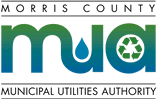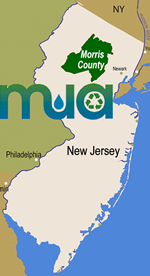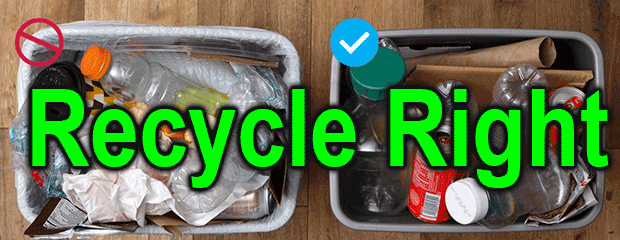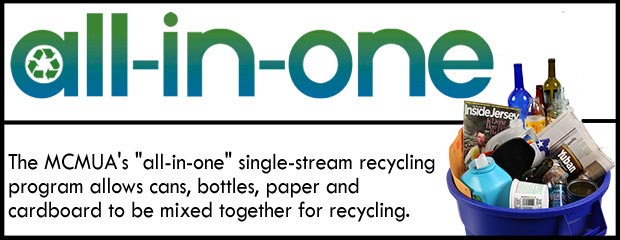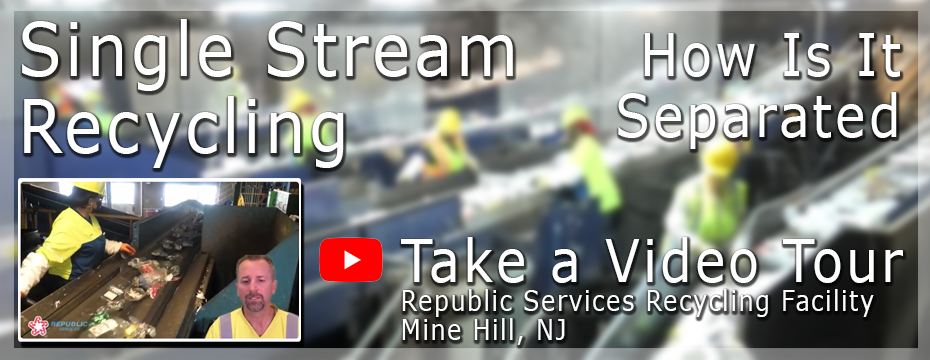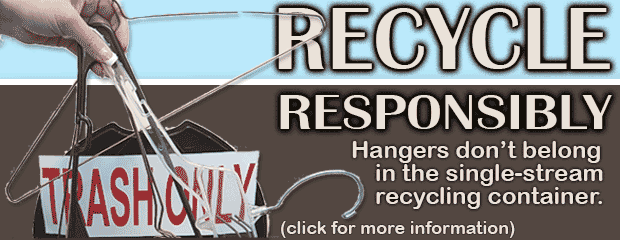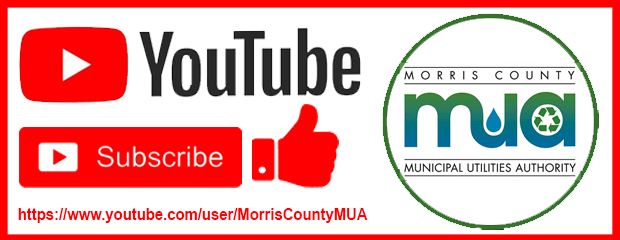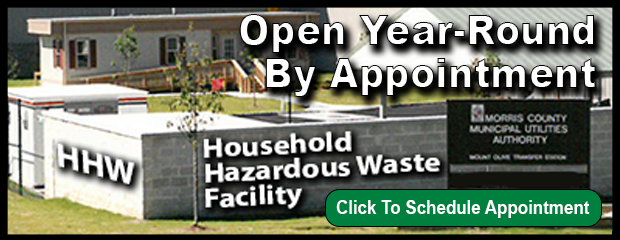Transfer Station Info (Tip Fee $113.00/ton)
- Mt. Olive Mon-Fri 7:30am-3pm; Sat 7:30am-11am
- Parsippany Mon-Fri 7am-3pm; Sat 7:30am-11am
- No Rental Trucks
- Payment by Account, Check, Credit Card. No Cash
MCMUA Single-Stream Recycling Collection
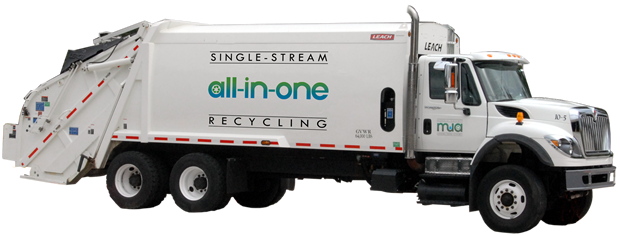
The MCMUA's "all-in-one" single-stream recycling collection program applies only to participating municipalities that contract with the MCMUA for recycling collection services. Click here for specific information about all Morris County municipal recycling programs.
50-Pound Limit - There is a 50-pound limit on the weight of any individual container set out for curbside recycling collection by the MCMUA. If you have more than 50 pounds of material to recycle, you must use multiple recycling bins, each weighing no more than 50 pounds.
Don't Tie the Paper - The single-stream facility and its screens work when paper is loose and two dimensional. Do not tie or bundle any newspaper, corrugated cardboard, magazines, junk mail or any other paper; just put all loose paper into the same recycling container with all of the other material. Flatten or cut corrugated as needed, and again, use additional containers when you have more than 50 pounds of recyclables.
Towns Where We Collect
- Boonton (Town of)
- Boonton Township
- Chatham Borough
- Chatham Township
- Chester Borough
- East Hanover
- Florham Park
- Hanover Twp.
- Long Hill
- Mendham Township
- Morris Plains
- Netcong
- Rockaway Borough
- Wharton
Arcade - Fun and Games
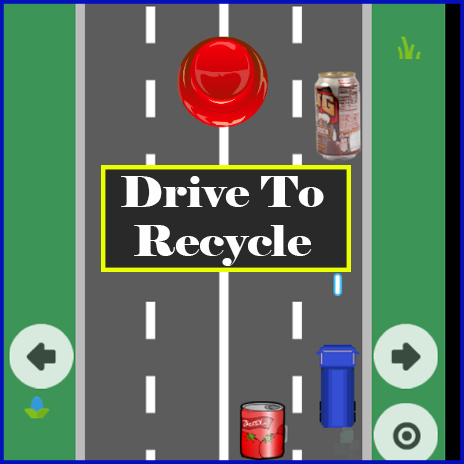
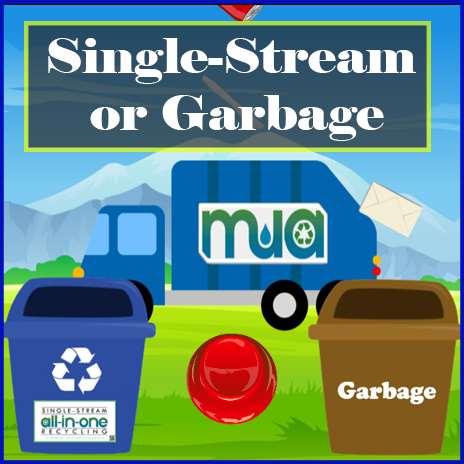
Single-Stream at Home
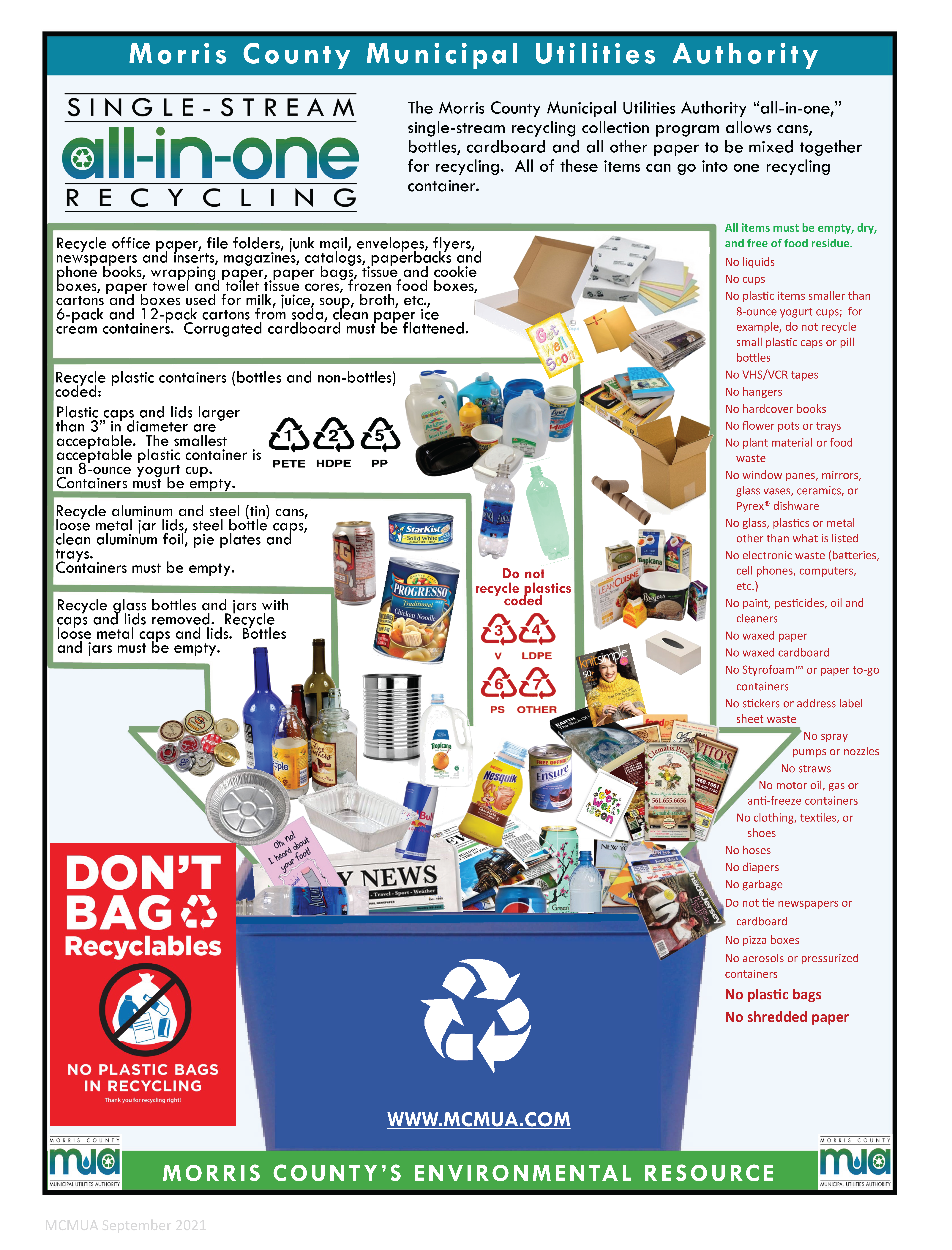
RECYCLE RESPONSIBLY
Avoid turning recyclables into litter on a windy day
- Use a lid to prevent the wind from blowing material out.
- If your material does not fit into one container, use more than one so that loose material is not sticking out.
- Flatten corrugated cardboard boxes and stack them into one unflattened box. Do not leave loose boxes on the ground.
Use properly sized containers
- The weight limit for a single container is 50 pounds when full.
- It is recommended that containers be no larger than 32 gallons each to avoid exceeding the weight limit.
- Containers must have handles.
- Retail stores now sell recycling carts with wheels that are too big. They will exceed the 50 pound weight limit when full. Do NOT use these large 64 and 95 gallon carts.
Only recycle what is acceptable
- Be careful to follow the recycling guidelines as advertised by your town and on the MCMUA’s website. There are specific guidelines regarding the materials that are and are not acceptable.
- Your cooperation with these guidelines is greatly appreciated. If you have questions please call your town’s recycling coordinator or the MCMUA at 973-285-8393.
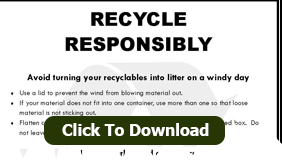
Tag-It and Leave-It Recycling Inspections
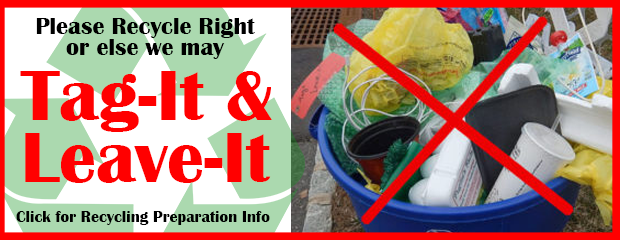
When in Doubt, Throw it Out — That’s the Best Decision for the Environment
Not everything with a recycling symbol goes into your curbside recycling bin for single stream collection.
"Tag-It and Leave-It" Recycling Effort (PDF Description)
The MCMUA, which collects recycling in many of Morris County’s 39 towns, implements a “tag-it and leave-it” inspection program. If your recycling contains contaminants, the entire bin could be left at the curb.
The goal is to ensure that bulk recycling loads sent by the MUA to the recycling market don’t get rejected (and sent to a landfill) because they contain too many items that don’t meet recycling standards.
The most problematic recycling contaminants found by the Morris County MUA include:
- Plastic bags (Take them to a retail store with a dedicated bin for bags. They jam machinery.)
- Plastic film/plastic packaging
- Foam/Styrofoam (Discard in the trash.)
- Hangers (Plastic, metal or wood — they jam up the machinery.)
- Food waste
- Wood scraps
- Plastic bottles/containers coded #3, #4, #6 & #7 (Recycle only plastic bottles/containers coded #1, #2 & #5. No medicine bottles at all).
Just for clarification, these items don’t belong in your recycling container either: Paper coffee cups, dirty pizza boxes, paper towels, and some less likely items such as diapers, bowling balls, hypodermic needles, animal carcasses, batteries and electronics. Batteries can cause a fire at a recycling center. People sort recycling – not machines, so keep them safe.
Also, recyclables must be empty, clean and dry — without food residue.
Download the MCMUA’s recycling flyer here and post it in your kitchen.
The MCMUA’s revised plastics acceptability guidelines now limits plastic recycling collection to only bottles/containers coded #1, #2 & #5.
Other Single-Stream Tips
- Clean Food Off Recyclables Please wipe and clean all food off the recyclables prior to putting them into the recycling bin. This will help to keep everything clean, dry and bug-free.
- Empty the Liquids Please drain all liquids out of the recyclables prior to putting them into the recycling bin.
- What About Bottle Caps? Bottle caps fall through the screens and cracks in the single-stream recycling facility. Put loose bottle caps into the garbage - not into the recycling bin.
-
What About Shredded Paper? First and foremost, as little paper as possible should be shredded - only those pieces of
paper with information on them that you don't want others to see. Beginning in 2022, shredded paper is unacceptable in the
single-stream recycling. Because shredded
paper is so small, it doesn't get sorted with other paper, and it winds
up in the trash at the end of the system.
- Click here to see a list of shredded paper vendors currently in the MCMUA's materials database.
- Some municipalities and non-profit entities conduct paper shredding events in an effort to provide an opportunity for the bulk shredding of paper. There is often
a small charge for this service to both help raise money for a charity and/or to pay for the shredding
company's equipment and time. Please check with any shedding program prior to delivery for
preparation instructions and pricing.
-

The UPS Store Document Shredding
Easy recycling of documents with secure shredding services available at UPS Stores nationwide. With shredding services available at The UPS Store locations nationwide, you can get rid of your personal and business documents using one of the leading document destruction vendors, Iron Mountain®. Shred your items to help protect yourself and your business from identity theft.
When you visit, UPS weighs your documents and then you'll place them into the secured, locked shredding bin. It's that easy
Benefits of Shredding at The UPS Store:
- AAA certified by the National Association for Information Destruction
- More secure than shredding at home
- Secure recycling of shredded material
- Convenient shredding locations near your home and office
- Appointments are available at many locations for your convenience.
Have a large quantity of paper that you need shredded? Contact your local store directly for help finding the best shredding solution and applicable pricing.
Single-Stream Flyers and Signs
(PDFs for paper flyers for download and/or print)
- Recycle Responsibly Flyer
- All-In-One Single-Stream Residential Recycling Flyer
- Unacceptable Items for All-In-One Single-Stream Recycling Flyer
- Plastic Film/Wrap Recycling Guide (7/28/2023)
- Shredded Paper Infographic (4/5/2023)
- Rigid Plastics Recycling Flyer
- Unacceptable Metal Items in Single-Stream Container Flyer
- Unacceptable Electronic Items for E-Waste Programs
- Battery Management - Easy as 1-2-3
- Unacceptable Rigid Plastics Recycling Flyer
(PDFs signs for recycling depots for download and/or print)
Republic Services (formerly ReCommunity) Single-Stream Recycling Facility
Republic Services Recycling
103 and 105 Iron Mountain Road
Mine Hill, NJ 07801
Tel: 973-328-7001 Fax: 973-328-7791
Click here for more information
Need to make business recycling easier? The Republic Services recycling facility accepts materials from businesses as a single-stream mix or with bottles and cans kept seperate from paper but you need to contact them directly. Please be aware that corrugated cardboard isn't the be-all and end-all of recycling for business. Click here to read about recycling mandates for Morris County businesses.
Tipping Floor - trucks deposit recyclables here
The MCMUA's role in single-stream begins at curbside and ends on the tipping floor (a concrete pad) at recycling facility where recyclables are dumped (or tipped) from collection and roll-off vehicles. From here on the facility begins to separate the single-stream mixture into salable commodities such as baled paper, plastics, metals, etc. The recycling facility then uses front-end loaders to place the single-stream recyclables in giant hoppers awaiting their turn to being the recycling roller coaster ride of their lives.
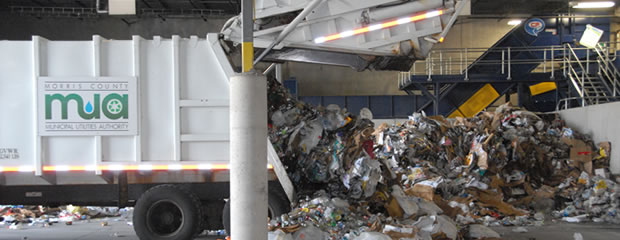
Initial Quality Control - picking out the contaminants
The single-stream recyclables are fed onto an inclined conveyor belt to begin the 45-second journey through the single-stream separation system. The material is conveyed to a quality control hand-picking station where workers remove what was incorrectly put into someone's recycling bin. Many plastic bags and other contaminants are removed here. Removing contaminants is labor intensive and expensive, so it's very important to put only the acceptable recyclable materials into recycling bins at home and businesses.
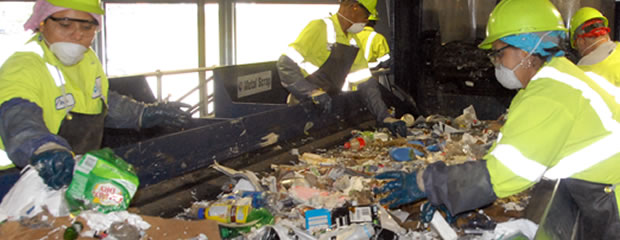
Rotary-Screen Separators - breaking up the single-stream
From the picking stations, the single-stream material is fed into a series of rotating disk/star screeners that go from narrow to wider gaps between the disks as the material floats uphill. These screens separate the two-dimensional material (paper) from the three-dimensional material (cans, bottles, and the other containers). This is the primary means by which the single-stream materials are processed into various subsets. From here on, the recycling mix is no longer considered single-stream.
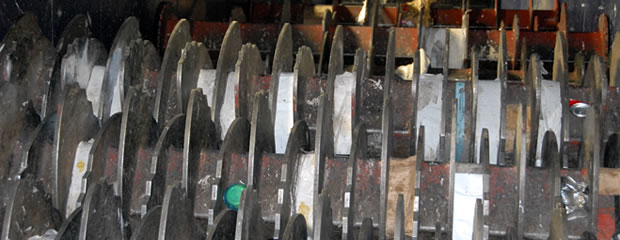
Conveyor System - the recycling super-highway
From the disk screens, the separated materials fall between the disks onto a series on conveyor belts that transport these materials to a variety of of picking stations and separation technologies. The conveyor system is a sophisticated transportation network that efficiently delivers material to subsequent processing stations.
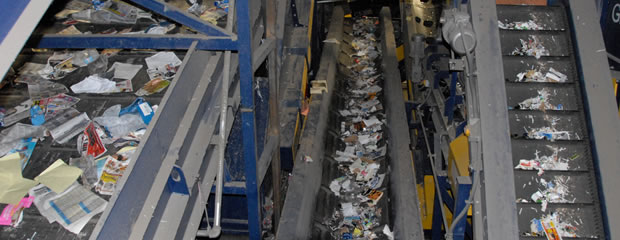
Paper Picking Stations - cleaning the paper to get top dollar
The conveyor belts deliver fiber (paper) to other conveyor belts where hand-pickers clean the material streams. There are conveyor belts for newspaper, mixed paper, and corrugated cardboard. Finally, there is a picking station where contaminants and paper are removed from bottle and cans prior to them being directed to the original and bottle and can recycling facility located next door at 103 Iron Mountain Road.
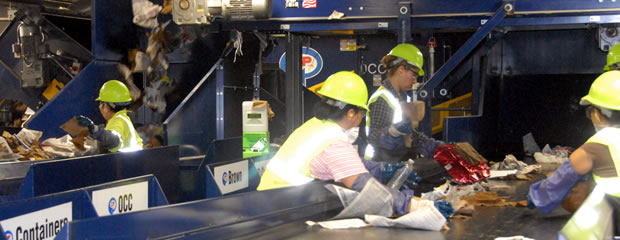
Bottle and Can Sorting Facility - processing the container mix
For over a decade, the MCMUA has delivered bottles and cans to the recycling facility located next door at 103 Iron Mountain Rd. Prior to 2011, FCR, Morris (the company that is now known as Republic Services operated the facility. Bottles and cans from the single-stream facility at 105 Iron Mountain Road are conveyed from that location to 103 for processing.
Bunkers and Baling - automated staging and compaction
After the material is picked and clean to the best capabilities of the system at the single-stream facility (105 Iron Mountain Rd), it is conveyed and staged in a series of seven bunkers, two for residue (garbage destined for the MCMUA Mount Olive transfer station), one for rigid plastic, and the remaining for corrugated, newsprint, and mixed paper. On demand, the material is automatically extracted from each bunker after a giant automatic door is hydraulically opened, gaining access to the recyclables in the bunkers. From the bunkers, the material is conveyed up to a baler that compacts the recyclables into bales tied in metal wire ready for sale and transport. The bunker system and the sophisticated automation technologies enable a variety of materials to be stored and automatically transported to one single baler. A forklift collects the finished bales as they are extracted from the baler and places them in storage areas waiting for transport to recycling markets throughout the world.
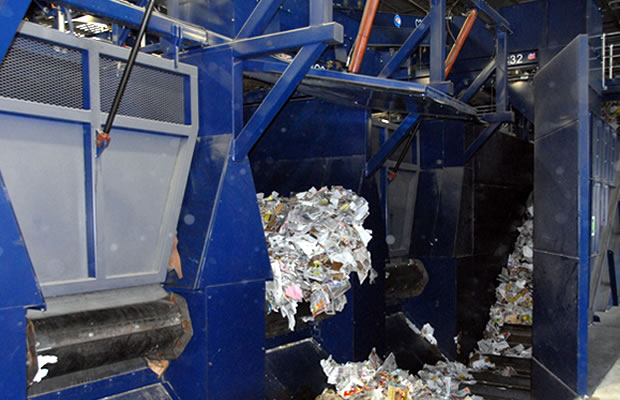
Tipping floor operations featuring the MCMUA recycling collection fleet.
Benefits of Single-Stream Recycling
- Collection Efficiencies - With all-in-one recycling, the single-stream mix of recyclables (bottles, cans and paper) can be collected at curbside using one truck. In the past when paper was collected separately from the cans and bottles, two trucks were used to collect this dual-stream mix of recyclables. Therefore, single-stream recycling collection ' reduces the resources used to collect the material. Fuel, worker hours, time, traffic, greenhouse gas emissions, accidents, and road wear are all reduced as a result of single-stream recycling collection.
- Lifestyle Improvement - Recycling is a lot easier now that it is all-in-one single-stream. No longer does one have to maintain multiple recycling bins for different recyclable materials. All of the common household recyclables now go together in an all-in-one container. Additionally, bundling and tying newspapers is no longer needed.
- Additional Materials - The MCMUA's all-in-one single-stream recycling program allows materials to be included in the recycling mix that were previously prohibited. These additional materials include wet-strength cardboard used for beer, soda and frozen food boxes. Also added are polyboard cartons and boxes used for milk, juice, soup, broth, etc. Finally, several new types of plastics can now be recycled. Please put unacceptable plastics into the garbage. When in doubt, throw it out and do not contiminate the recycling mix.
- In-county Facility - The Republic Services recycling facility employs dozens of employees and bring private investment in green technologies and jobs to Morris County.
Best & Worst for Single-Stream
The MCMUA has entered into contracts with both ReCommunity Recycling and Morris County towns establishing partnerships benefiting everyone when recycling is done properly. The better the recycling, the more all will share in the profits and environmental benefits associated with single-stream recycling! Optimizing the single-stream mixture by including valuable recyclables and minimizing garbage improves the bottom-line of the recycling facility and the shared profits of the contracting partners.
Best for Single-Stream
- Clean, Empty and Dry - To keep recyclables recyclable make sure all materials are clean, empty and dry. Contaminated recyclables, which are wet, dirty and/or not empty, render them non-recyclable, therefore, make sure there is no food residue on the materials and make sure there are no liquids in any of the containers.
- Aluminum - When aluminum is recycled, a tremendous amount of energy and resources are conserved; therefore, aluminum is a very valuable commodity. All empty aluminum cans should be recycled. New to single-stream recycling is the inclusion of the aluminum foil, trays and pie plates (no food residue allowed).
- Paper - Corrugated cardboard, chipboard, newspaper, junk mail and magazines are all in great demand by recycling markets today and bring in good revenue. Everyone should recycle all the paper that is acceptable in the all-in-one single-stream recycling program. Most paper/cardboard is now acceptable as long as it is not contaminated with food or grease, is not wax coated and/or is not a sticker or a label. Note that while used stickers and labels do not have to be removed from paper, new stickers and labels are not recyclable and can interfere with the machinery.
-
Plastics - Made from petroleum products, plastics can be expensive to manufacture and require a
non-renewable resource to produce. As such, the demand for recycled plastics is high and generates substantial revenue for
the recycling program. As of 2019, only plastic coded #1, #2 and #5 are acceptable in the
all-in-one single-stream mix and add significantly to the value the recycling mix. Plastics coded #3 PVC, #4 LDPE, #6 polystyrene (Styrofoam) or #7 other
are unacceptable in the all-in-one single-stream system as they contaminate the process and cost time and money to pick out and
put into the residue (garbage).
Worst for Single-Stream
- Hazardous Waste - Hazardous waste can be dangerous to curbside recycling collectors and facility operators. No liquids, especially hazardous waste; are to be included with single-stream recyclables. Click here for information about the MCMUA household hazardous waste program through which hazardous waste can be managed safely and correctly.
- Garbage - Garbage belongs in the garbage. Even though human beings and equipment screen for unacceptable materials, garbage does not belong in in the single-stream recycling mix. The cost of every ton of garbage extracted at the single-stream recycling facility is deducted from the profits the community shares in the marketing of the recyclables.
- Plastic Bags or Film - While single-stream recycling has enabled the MCMUA to collect additional types of plastics, plastic bags and/or wrap are not acceptable in the single-stream recycling mix. Plastic wrap gets twisted in the rotating screens and is a nuisance material that must be cleaned from the recycling machinery. Plastic bags filled with recyclables are not to be put into the recycling bin; empty all plastic bags and discard them in the trash.
- Liquids - Liquids do not belong in the single-stream recycling mix. For instance, a water bottle with some water in it will usually be too heavy to be captured by the single-stream recycling process and will then fall through the cracks and end up as residue (garbage). Additionally, liquids are heavy - transporting them by truck is a waste of effort and energy.
- Scrap Metal - Large pieces of metal can damage the single-stream recycling equipment. Scrap metal is never to be put into curbside recycling bins. Click here for a flyer describing unacceptable items that are not to be placed in the single-stream recycling container. The only metals allowed in the single-stream recycling mix are aluminum cans, containers, foils, trays and pie plates as well as steel (tin) cans, staples and paper clips. Scraps metal is acceptable at quite a few municipal recycling depots, as well at privately owned and operated scrap yards.
- Fire Works - Do no place any fireworks, their packaging or their spent parts in the recycling bin. All used fire work materials must be placed in the garbage for disposal. Additionally, under no circumstances are unused fire works to be disposed of in garbage or recycled. Please call your local police department if you have unused fire works which need to be disposed to obtain disposal information.
- Lawn signs, such as those used during elections or by realtors, are not acceptable in a single-stream recycling container. The metal legs on the sign may be recycled in a scrap metal container or with a scrap metal dealer.
- Batteries - Batteries of ALL types (alkaline, Li-ion, rechargeable, electronic device, automotive, button cell like those used in hearing aids, watches, and garage door openers) pose many dangers to employees and equipment and do not belong in the recycling bin. The safety of recycling facility employees is an important concern. Batteries can cause serious burns to the eyes and skin and can also cause fires at recycling facilities. Click here to learn about the proper disposal and/or recycling of batteries.
-
Plant Containers/Pots - Plastic plant containers/pots are not acceptable as part of the single-stream recycling program so please discard plastic plant containers/pots in the garbage or use the recycling program provided by Home Depot. At all The Home Depot Garden Centers nationwide, customers can bring back their empty pots for growers to refill. When the pots are no longer reusable, The Home Depot's partner, East Jordan Plastics Inc., turns them into new pots, trays, and hanging baskets.
HOME DEPOT PLANT POT RECYCLING PROGRAM
